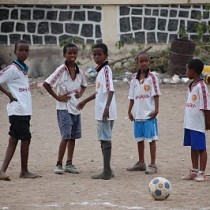
DJibouti:An accelerating downward spiral of decline
An accelerating downward spiral of decline
 With a food blockade and mass confiscations and in the Northern Districts, unemployment at 70%, a fiscal crisis, investment disappearing, and the bulk of the population with no running water, electricity or health services, Djibouti’s long held reputation for stability is fast fading away. The use of increasing brutality to keep the regime secure has led inevitably to resistance – which in turn has led to more brutality, and so the spiral continues.
With a food blockade and mass confiscations and in the Northern Districts, unemployment at 70%, a fiscal crisis, investment disappearing, and the bulk of the population with no running water, electricity or health services, Djibouti’s long held reputation for stability is fast fading away. The use of increasing brutality to keep the regime secure has led inevitably to resistance – which in turn has led to more brutality, and so the spiral continues.
The regime’s spurious association of commercial success with potential political resistance has led to confiscations of businesses, plundering of foreign investors’ assets, and a near-impossible climate for new projects. Taxes are among the most complex and punitive in the world, and so arbitrarily applied that even small firms face multi-million dollar random tax threats. Recently, new potential investors have walked away after receiving demands for large ‘free’ equity stakes. The result is that opportunities for the mass of the population have disappeared. This is a dangerous development.
Water is in short supply and food production is negligible. Almost all food and other goods are imported. A currency pegged to the falling dollar, a monopolistic and corrupt transport sector, and increased insurance costs, have caused prices to rise, while net average income has fallen. Half the urban population has no reticulated water supply, and those that do receive supply for only a few hours a day. Electricity is the second most expensive in Africa, but only a minority of households receive (often interrupted) supply. Businesses that rely on electricity cannot assume they will have supply during the day, and high cost private generation therefore substitutes, further damaging the economy.
The fiscal position is close to catastrophic, with international institutions describing it as ‘unsustainable’, and lamenting the additional costs that accrue by failing to meet repayment deadlines for no reason other than adminsistrative inefficiency. This is an unnecessary waste of scarce finance, given that up to four out of ten city inhabitants live in informal shacks or on the street, and that infant mortality is unacceptably high. The tragedy of this sitation is deepened by the extraordinary opportunities offered by Djibouti, with its strategic location at the entrance to the Red Sea and as an export outlet for the heavily populated landlocked countries to the West.
As ethnic tensions deepen and the government begins to lose its grip on its own territory, commanders of foreign military bases have started to worry. Security in Djibouti City has declined, and the fear of domestic or foreign militancy is ever-present. In addition, despite heavy pressure from international lenders to Djibouti, chaotic bank licensing and an absence of proper regulation has raised suspicions about the sources of some of the funds arriving in Djibouti. Measures to prevent money laundering or handling terrorist and pirate finances remain curiously unimplemented.
Until recently, the population held out some hope that a change in regime was imminent, since the President was coming to the end of his two-term limit. Whilst most expected the April 2011 elections to be rigged, there was some hope in a potential new face. However, since the increasingly authoritarian President changed the constitution to allow him to stand again and again, hope has withered away.
The fear of a meltdown in social order is now coupled with concern that the President will only leave office upon his demise – and given his poor health, the prospect of a political vacuum looms over the nation and the security of its foreign bases. In a few short years Djibouti has gone from a beacon of stability in a turbulent region to a kleptocracy absent of public legitimacy, and a security threat.
This manifesto shows that there is another vision. A concrete one. A vision of a modernised, compassionate and unified state, where all citizens are treated with respect. This is no pipe dream. The economic opportunities lie undeveloped, and the needs of the poor lie waiting. A peaceful transition, and improved security for foreign bases, form part of this vision. The Red Sea Committee for Peace & Stability hereby sets out its well-researched and comprehensive ‘shovel-ready’ reforms. Please support us.
Leave a comment
| Copyright © 2009 - 2024 Sunatimes News Agency All Rights Reserved. |
| Home | About Us | Diinta | Reports | Latest News | Featured Items | Articles | Suna Radio | Suna TV | Contact Us |
 0
0 









DJibouti:An accelerating downward spiral of decline
The regime’s spurious association of commercial success with potential political resistance has led to confiscations of businesses